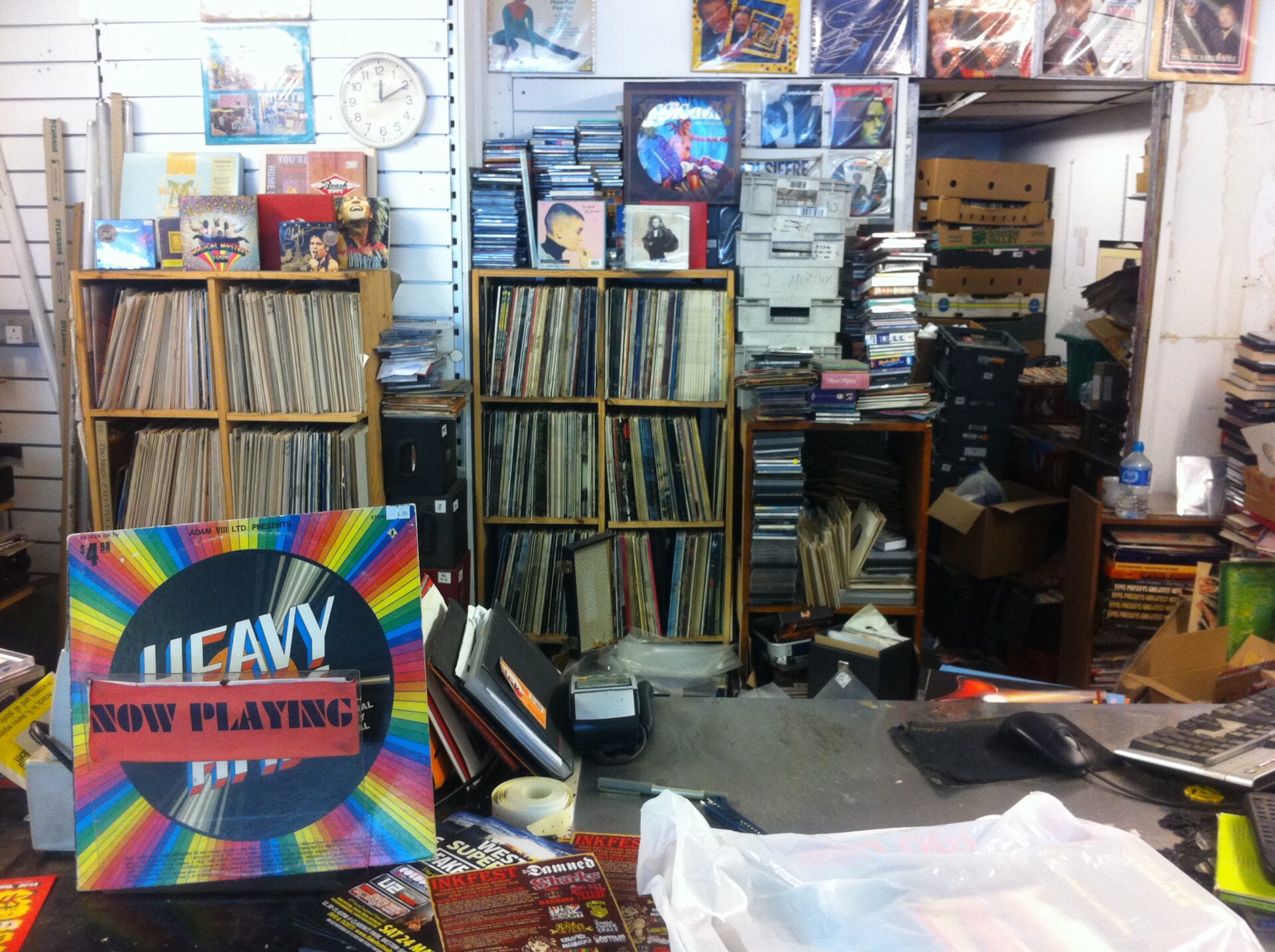In a few days time, music fans, collectors and opportunists will be queuing outside record shops up and down the UK for Record Store Day. I feel a strong need to remind people that the yearly event shouldn’t just be about buying overpriced and often unnecessary reissues or snapping up rare items to flog for a profit. In my opinion it should be just as much about digging through the crates, scanning the shelves and finding something that appeals. Even if your budget and financial priorities limit your choices to a browse through the bargains section, even that’s enough to do your bit.
If you’ve visited the Somerset seaside resort Weston-Super-Mare, you may or may not know about Revolver, an independent record shop located near the Town Hall. Situated on the edge of the town centre, its large red sign and box of bargain vinyl located outside the shop immediately grabbed my vision as I walked from the train station to the town centre. A visit to this music retailer was inevitable.
Occupying the centre of the shop is a varied selection of vinyl LPs arranged by artist and genre, and on the floor are boxes full of records priced at £5 for three, with many surprise bargains to be found. I also browse through picture discs, 7″ singles, and 12″s, many of them also being sold at small prices. Elsewhere I find lots of cheap second hand CDs and even a range of cassettes. Spending at least an hour in there isn’t long enough, and once I’ve found a few desired purchases, it feels almost dangerous to browse further in case I end up finding more and exceeding my spending limit. Same with any good record shop.
After making my purchases, I emerged from Revolver with a satisfying mixture of vinyl LPs (The Smiths, Peter Gabriel, Bob Dylan), CD singles (Suede, Super Furry Animals), a CD album by The Sugarcubes and a 12″ single by The Senseless Things. But before I left, I had a chat with the shop’s owner Andy…
So when did Revolver first open? How different was the shop back then? If Revolver had an aim, objective or a main agenda what would it be?
“Having worked in entertainment retailing for nearly twenty years, when the chain that I was working for went out of business in 2004 it seemed logical to set up on my own. Not only because of the need to earn a living and because it was the only type of work I had ever done but also because the contraction in High Street music retailing in the early years of this century meant that music fans in this town would have been left with a choice of only Woolworths or WH Smith as a physical. bricks and mortar, shop.
The basic premise was “what if you woke up one morning with an urge to buy (say) The Beach Boys ‘Pet Sounds’ CD – where would you go locally to buy it?” From 80/20 in favour of CD about five years ago it’s now almost totally reversed. There have been a few days in recent months where I haven’t sold any CDs at all!”
How did the arrival of the digital age affect the shop?
“It’s certainly changed peoples perspective on the pricing of CDs : “why’s is this so expensive (i.e. eight or nine pounds) it’s only four quid on Amazon” was a frequent question a few years ago. The differences in purchasing power, economies of scale etc. doesn’t mean anything when there’s a 100% difference in price between in-store and on-line.”
Have you seen first hand evidence of the recent vinyl revival?
“Being a non-specialist means that you see customers of all ages and backgrounds – making sure you have stock that appeals to many different kinds of people is one of the challenges for the non-specialist. In recent years there’s been a marked increase in teenage and early twenties customers looking for “classic” vinyl records as well as in middle aged people looking to re-buy records that they owned and loved when they were themselves teenagers!
In difficult economic times people often seek comfort in nostalgia : during the seventies recession there was a rock’n’roll revival and a sudden revival of 1920s fashions. The eighties is alone in recent decades in not having seen a major nostalgia movement, I think this was because of the sudden expansion of the UK economy.
Secondly – people are, by nature, keen to own things. With the increase in the popularity of MP3 etc. I think people were missing the physicality of owning the music in a tangible way.
Thirdly – there’s a realisation that music on vinyl does actually sound better than on CD/MP3 plus you get a sleeve to look at and study and often the song lyrics which you can read (unlike with the tiny print used in CD booklets)
Fourthly – it demonstrates commitment to a group or even to an idea of what music is and what it says about you. If you own all of The Smiths’ albums on MP3 it’s very difficult to share this with the rest of the world. A T-shirt and a copy of the Meat Is Murder LP in your bag tells the world a lot about you in a easily understood and digested way.
It’s not really a revival – demand never really went away it was simply that there were a couple of generations who were won over by the pro-CD propaganda and they dropped out of the market for a few years. What we’re seeing is people returning to a format that they like and understand.
The #fashion# element might mean that more young people choose to build their collection as a combination of MP3 + vinyl but, as many of my customers will tell you, once you start buying vinyl it’s near impossible to stop.
I’d argue that the twenty year love affair with the CD was the fashion phase and people are now returning to a more traditional way of buying, consuming and listening to music.”
Would you say the future was looking bright for you and other independent record shops in 2014?
“Yes – but I would imagine that any specialist shop would see it’s regular customer numbers increase over time. It’s a sure sign that you’re doing something right when you have people who come in on a weekly basis to see what’s new.
I’m not sure that the large stores relying on CD/DVD sales will survive. If CD is still around all of the sales of mainstream chart music will probably be through supermarkets or on-line and CD in physical stores will be a niche area in the way that vinyl was treated in the mid-nineties in stores like HMV.
I’d like to think that within five years every town of a decent size would have it’s own little record shop serving the local community and I’ll be surprised if specialist stores in the big cities don’t all survive and prosper.”
What records have you been enjoying the most recently? Old and new.
“It changes on a nearly daily basis. The joy of working with secondhand records every day is that you always find new things to listen to – so the favourite of the last year would probably be something from 1967 or 1975 or 1982 of which I was previously unaware.”
Anything else you’d like to add? (Anything! Special offers, events, future plans or an opinion you’d like people to read… Anything!)
The pricing of the vinyl version of new release LPs needs addressing. I would love to stock more new release vinyl LPs but there are two problems : one is the supply – there’s no wholesale operation to supply specialist stores so stock either has to come from the major distributors (see above for the problems with that) or through a third party in which case the mark-up to make any profit at all makes the selling price dangerously high.
The second is the retail price itself. Because print runs are small and the set-up costs are high it’s impossible to sell the vinyl version of an LP at around the same price as the CD version (i.e. £15). Most new vinyl LPs have to be sold for £20+ to make any profit at all on them.
When record companies work out how to get the manufacturing costs down so that the customer has a straight choice between similarly priced CD or LP versions of a release we will see a very real and marked upswing in the sales of the vinyl versions.”
Cheers, Andy.





